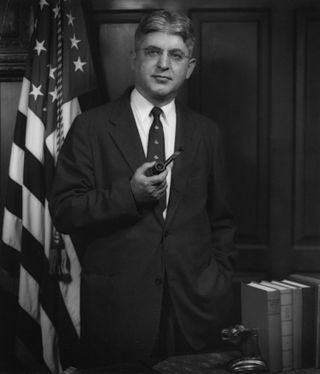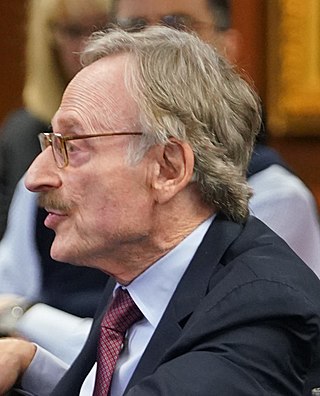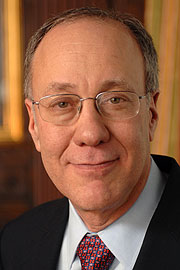Related Research Articles

James Joseph Heckman is an American economist and Nobel laureate who serves as the Henry Schultz Distinguished Service Professor in Economics at the University of Chicago, where he is also a professor at the College, a professor at the Harris School of Public Policy, Director of the Center for the Economics of Human Development (CEHD), and Co-Director of Human Capital and Economic Opportunity (HCEO) Global Working Group. He is also a professor of law at the Law School, a senior research fellow at the American Bar Foundation, and a research associate at the NBER. He received the John Bates Clark Medal in 1983, and the Nobel Memorial Prize in Economic Sciences in 2000, which he shared with Daniel McFadden. He is known principally for his pioneering work in econometrics and microeconomics.

The National Bureau of Economic Research (NBER) is an American private nonprofit research organization "committed to undertaking and disseminating unbiased economic research among public policymakers, business professionals, and the academic community." The NBER is known for proposing start and end dates for recessions in the United States.

Arthur Frank Burns was an American economist and diplomat who served as the 10th chairman of the Federal Reserve from 1970 to 1978. He previously chaired the Council of Economic Advisers under President Dwight D. Eisenhower from 1953 to 1956, and served as the first Counselor to the President under Richard Nixon from January to November 1969. He also taught and researched at Rutgers University, Columbia University, and the National Bureau of Economic Research.

Wesley Clair Mitchell was an American economist known for his empirical work on business cycles and for guiding the National Bureau of Economic Research in its first decades.

Richard Barry Freeman is an economist. The Herbert Ascherman Professor of Economics at Harvard University and Co-Director of the Labor and Worklife Program at Harvard Law School, Freeman is also Senior Research Fellow on Labour Markets at the Centre for Economic Performance, part of the London School of Economics, funded by the Economic and Social Research Council, the UK's public body funding social science. Freeman directs the Science and Engineering Workforce Project (SEWP) at the National Bureau of Economic Research (NBER), a network focused on the economics of science, technical, engineering, and IT labor which has received major long-term support from the Sloan Foundation.

Michael Jay Boskin is the T. M. Friedman Professor of Economics and senior fellow at Stanford University's Hoover Institution. He also is chief executive officer and president of Boskin & Co., an economic consulting company, and serves on the Commerce Department's Advisory Committee on the National Income and Product Accounts.

Leonid Hurwicz was a Polish–American economist and mathematician, known for his work in game theory and mechanism design. He originated the concept of incentive compatibility, and showed how desired outcomes can be achieved by using incentive compatible mechanism design. Hurwicz shared the 2007 Nobel Memorial Prize in Economic Sciences for his seminal work on mechanism design. Hurwicz was one of the oldest Nobel Laureates, having received the prize at the age of 90.

Roger Bruce Myerson is an American economist and professor at the University of Chicago. He holds the title of the David L. Pearson Distinguished Service Professor of Global Conflict Studies at The Pearson Institute for the Study and Resolution of Global Conflicts in the Harris School of Public Policy, the Griffin Department of Economics, and the college. Previously, he held the title The Glen A. Lloyd Distinguished Service Professor of Economics. In 2007, he was the winner of the Sveriges Riksbank Prize in Economic Sciences in Memory of Alfred Nobel with Leonid Hurwicz and Eric Maskin for "having laid the foundations of mechanism design theory." He was elected a Member of the American Philosophical Society in 2019.
John Howland Cochrane is an American economist who has served as the Rose-Marie and Jack Anderson Senior Fellow at the Hoover Institution since 2015. A specialist in financial economics and macroeconomics, he has been a professor of finance and economics by courtesy at the Stanford Graduate School of Business since 2016. From 1994 to 2015, he served as the AQR Capital Management Distinguished Service Professor of Finance at the University of Chicago Booth School of Business.
Dora L. Costa is an American economics professor at the University of California, Los Angeles where she is the Kenneth L. Sokoloff Professor of Economic History. She is also the department chair of the economics department. In addition to her teaching position, Costa is a research associate at the National Bureau of Economic Research (NBER).

Carlos A. Végh is a Uruguayan academic economist who, since 2013, is the Fred H. Sanderson Professor of International Economics at the Johns Hopkins School of Advanced International Studies (SAIS), and holds a joint appointment with Johns Hopkins' Department of Economics. He is also a research associate at the National Bureau of Economic Research since 1998. He was the World Bank's chief economist for Latin America and the Caribbean from February 1, 2017 to June 30, 2019, while on leave from Johns Hopkins. He was previously a professor of economics and vice-chair of undergraduate studies at UCLA (1996-2005) and professor of economics at the University of Maryland (2005-2013). His research work on monetary and fiscal policy in emerging and developing countries has been highly influential in both academic and policy circles. In particular, his work on fiscal procyclicality in emerging markets has been instrumental in generating a copious literature on the subject, which has influenced the adoption of fiscal rules in many emerging markets.
John Whitefield Kendrick was a pioneer in productivity measurement and economic accounting.
Jeffrey Gale Williamson is the Laird Bell Professor of Economics (Emeritus), Harvard University; an Honorary Fellow in the Department of Economics at the University of Wisconsin (Madison); Research Associate at the National Bureau of Economic Research; and Research Fellow for the Center for Economic and Policy Research. He also served (1994–1995) as the president of the Economic History Association. His research focus is and has been on comparative economic history and the history of the international economy and development. Economist Hilary Williamson Hoynes is his daughter.

Francine Dee Blau is an American economist and professor of economics as well as Industrial and Labor Relations at Cornell University. In 2010, Blau was the first woman to receive the IZA Prize in Labor Economics for her "seminal contributions to the economic analysis of labor market inequality." She was awarded the 2017 Jacob Mincer Award by the Society of Labor Economists in recognition of lifetime of contributions to the field of labor economics.

Burton A. Weisbrod is an American economist who pioneered the theory of option value, and the theory of why voluntary nonprofit organizations exist, He also developed the methodology for valuing voluntary labor. He advanced methods for benefit-cost analysis of public policy by recognizing the roles of externality effects and collective public goods in program evaluation. He applied those methods to the fields of education, health care, poverty, public interest law, and nonprofit organization. Over a career of fifty years, he published 16 books and over 200 scholarly articles. He is currently the Cardiss Collins Professor of Economics Emeritus and a Fellow of the Institute for Policy Research at Northwestern University.
Trevon D'Marcus Logan is an American economist. He is the Hazel C. Youngberg Trustees Distinguished Professor in the Department of Economics and Associate Dean of the College of Arts and Sciences at Ohio State University, where he was awarded the 2014 Alumni Award for Distinguished Teaching. He is also a research associate at the National Bureau of Economic Research. In 2014, he was the youngest-ever president of the National Economic Association. In 2019, he was the inaugural North Hall Economics Professor at the University of California, Santa Barbara. In 2020, he was named the inaugural director of the National Bureau of Economic Research Working Group on Race and Stratification in the Economy. His research mainly focuses on economic history, including studies of African American migration, economic analysis of illegal markets, the economics of marriage transfers, and measures of historical living standards, with an emphasis on racial disparities in the United States.
Gary Don Libecap is a Distinguished Professor at the Bren School of Environmental Science & Management and Distinguished Professor of Economics at the University of California Santa Barbara. Libecap is a research associate at the National Bureau of Economic Research; a senior fellow at the Property and Environment Research Center, and a member of the Research Group on Political Institutions and Economic Policy, Harvard University. He was the Erskine Professor at the University of Canterbury, New Zealand, 2019; Pitt Professor of American History and Institutions at Cambridge University 2010–11, and was previously the Anheuser Busch Professor of Entrepreneurial Studies, Economics, and Law at the University of Arizona.
Clark Spencer Larsen is an American biological anthropologist, author, and educator. His work focuses on bioarchaeology, the study of human remains from archaeological settings. Although his interests span the entire record of human evolution, his research largely pertains to the last 10,000 years, a period of dynamic change in health, well-being, and lifestyle, much of which relates to population increase, overcrowding, and nutritional decline that co-occurred with the transition from hunting and gathering to agriculture, creating living conditions that humans are grappling with to the present day.
Michael David Bordo is a Canadian and American economist, currently Board of Governors Professor of Economics and Distinguished Professor of Economics at Rutgers University. He is a research associate at the National Bureau of Economic Research as well as a Distinguished Visiting Fellow at the Hoover Institution at Stanford University. He is the third most influential economic historian worldwide according to the RePEc/IDEAS rankings. He was a student of Milton Friedman and has co-authored numerous books and articles with Anna Schwartz.
References
- 1 2 Steckel, Richard H. (2007). "Curriculum-Vitae" (PDF). Retrieved 2013-09-17.
- ↑ Usher, Rod (14 Oct 1996). "A Tall Story for Our Time". Time. Vol. 148, no. 16.
- ↑ Ohio State University:Richard H. Steckel (Accessed Dec 2011)
- ↑ National Bureau of Economic Research: Richard Steckel (Accessed Dec 2011)